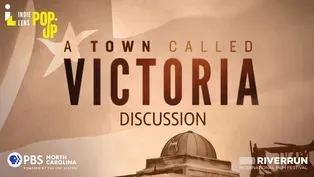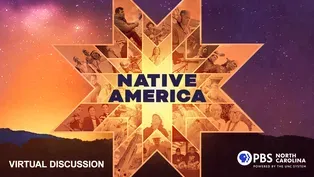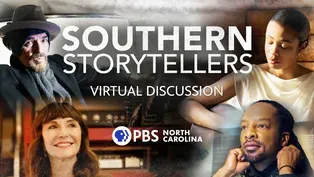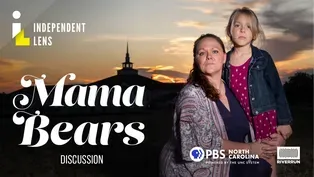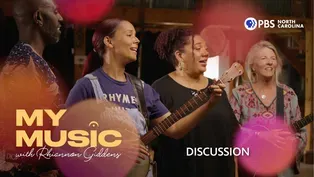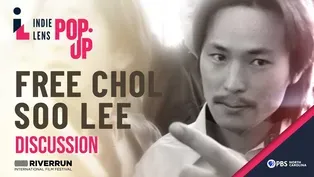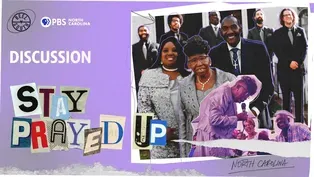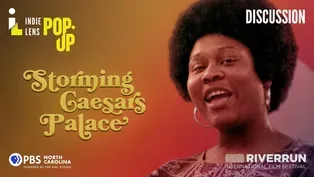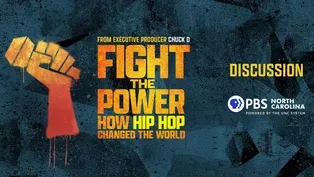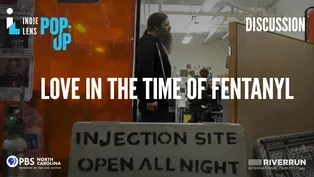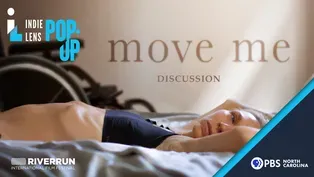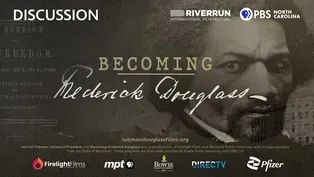PBS North Carolina Specials
Discussion - Sci NC
9/12/2023 | 26m 6sVideo has Closed Captions
Sci NC executive producer and host, Frank Graff, chats about upcoming Season 6 of Sci NC.
Frank Graff, executive producer and host of PBS NC's "Sci NC" leads a conversation with the science production team about the science stories featured on Season 6. Panelists include Rossie Izlar, Michelle Lotker and Evan Howell.
PBS North Carolina Specials
Discussion - Sci NC
9/12/2023 | 26m 6sVideo has Closed Captions
Frank Graff, executive producer and host of PBS NC's "Sci NC" leads a conversation with the science production team about the science stories featured on Season 6. Panelists include Rossie Izlar, Michelle Lotker and Evan Howell.
How to Watch PBS North Carolina Specials
PBS North Carolina Specials is available to stream on pbs.org and the free PBS App, available on iPhone, Apple TV, Android TV, Android smartphones, Amazon Fire TV, Amazon Fire Tablet, Roku, Samsung Smart TV, and Vizio.
Providing Support for PBS.org
Learn Moreabout PBS online sponsorshipMore from This Collection
Discussion - A Town Called Victoria - Independent Lens
Video has Closed Captions
The filmmaker and former Victoria residents share their story. (46m 51s)
Discussion - Native America Season 2
Video has Closed Captions
Panelists discuss preserving the languages of Native American tribes. (39m 1s)
Discussion - Southern Storytellers
Video has Closed Captions
Author David Joy and others discuss storytelling and their new PBS series. (42m 13s)
Discussion - Mama Bears | Independent Lens
Video has Closed Captions
Producer and director Daresha Kyi discusses the film and LGBTQIA+ advocacy. (34m 41s)
Discussion - My Music with Rhiannon Giddens
Video has Closed Captions
Discussing the series with producers Will & Deni McIntyre and country artist Rissi Palmer. (39m 56s)
Discussion - Free Chol Soo Lee | Independent Lens
Video has Closed Captions
Local lawyers, professors and nonprofit leaders discuss wrongful convictions and reentry. (40m 44s)
Discussion - Stay Prayed Up, Reel South
Video has Closed Captions
The filmmakers discuss their journey with Mother Perry and The Branchettes. (45m 4s)
Discussion - Storming Caesars Palace | Independent Lens
Video has Closed Captions
Local professors and nonprofit leaders discuss welfare and the social safety net. (33m 2s)
Discussion - Fight the Power: How Hip Hop Changed the World
Video has Closed Captions
Local experts discuss the history of hip hop with PBS North Carolina. (59m 43s)
Discussion - Love in the Time of Fentanyl | Independent Lens
Video has Closed Captions
Local harm reductionists, therapists and others discuss the opioid crisis and more. (55m 44s)
Discussion | Independent Lens: Move Me
Video has Closed Captions
A dancer with blindness and disability advocates discuss adaptable arts programs. (38m 46s)
Discussion | Becoming Frederick Douglass
Video has Closed Captions
Scholars, professors and historians discuss the life and legacy of Frederick Douglass. (43m 43s)
Providing Support for PBS.org
Learn Moreabout PBS online sponsorship- We tried to get the cockroaches to do that, but there was no cockroach available at the time, so we settled for the T-Rex.
A little preview of some of the stories coming up in season six of "Sci NC."
We hope you enjoy them, hope you learn a little bit as well.
I'm Frank Graff, executive producer and host of "Sci NC."
As you can see from the stories, I hope you can see that we cover a broad range of science topics.
We cover them all over the state, and that has been the goal for "Sci NC" ever since the program started.
PBS North Carolina's one of the largest PBS stations in the entire system.
We're one of the few that produce a science program, and the goal of that program is to get science out of the labs, the government labs, the university labs, the private industry, and bring it out, make it easy to understand, and most importantly show how science relates to all of us and how science really powers our entire lives.
And that is, again, that's the goal of the program, and to do that, that is not a one-person job by any means.
We have a tremendous production team in the studio, but I am privileged to work with three really incredible, really amazing science journalists and producers.
So I wanna bring them on now.
Let me introduce them to you.
Rossi Isler, wave hi.
Michelle Lotker, wave hi.
Evan, wave hi.
And Tiffany, wave hi as well.
Tiffany's helping us out tonight as well.
Please send us your questions in the chat about the upcoming season, about how we produce stories, what we do to put the show together.
And so let me start there.
Rossi, you've been producing with "Sci NC" for the longest time.
Let's start with you, you lucky person, you.
Tell us a little bit about why science matters, why working on this program is so important to you.
- Well, I have this theory that if you know more about stuff, then you care more about it.
So for example, if you're walking down the street and you see, like, a random pine tree but you don't know anything about it, but if you watch a program or read something and you knew that it was a longleaf pine that supports, you know, a threatened- [crackling drowns out Rossi] Woodpecker.
Ooh, is that me?
[chuckles] I don't think so.
keep moving.
You're gonna be more invested in that tree.
So we see the same thing with issues like climate change.
The more you know, the more you're invested.
And to me that just matters so much.
Good science communication is essential for creating engaged communities and honestly a better world.
So that's why I think what we do is so important.
- Great, thank you.
Michelle, you started your career as a scientist, a research assistant first.
Tell us, what does it mean to you to be able to tell stories to make science more relatable, more understandable to people and to do it throughout the state?
[no audio] [no audio] Michelle, I'm... Hmm.
I'm not hearing you, I'm not sure what's going on.
- Maybe toss to Evan.
Evan.
- Yeah, Evan.
We'll figure that out, yeah.
Evan, go ahead.
You, you're a lot like me.
We both started our careers in news before going to public TV.
What makes a good story?
What does bringing science to the public mean to you?
- That's right, I, well, stand by for those technical difficulties, but- - [chuckles] There you go.
- So as far as [chuckles] science goes, they're pretty much like any story.
You're always looking for the one nugget of truth.
Of course, national cable news where I used to work is a bit different than science, where science, we look at the facts, and to me it's kinda like an onion.
You know, it's the slow reveal and the slow reveal of not just what the science is but the actual people behind it.
That's what I think about the whole science story paradigm, that's a fancy word.
And thankfully, this state is chockfull of science stories, with the great university system and everything else.
- Yeah, there are times when, you know, there's a lot of ways we find stories, we can get at that a little bit, but there are a lot of times you're looking at stories, you're thinking, that's a really good story.
Wow, how do I tell it?
And yeah, that's a challenge.
And Michelle, go back to you, I think we've got the technical difficulties, as they say, worked out.
You were a scientist, now a science journalist.
How do you tell a good science story, and why is it important to tell it?
- Yeah, thanks, can you guys hear me now?
Excellent.
- All good.
- Okay, so even though I was a scientist, sometimes technical difficulties, of course.
I started off as a scientist because I was really curious about the world around me, how everything worked, why it was there, what the creatures in it were doing.
And I know that I'm not the only person with that curiosity, so being able to explore all the cool science happening across the state and bring all the North Carolinians and everyone else that tunes into our show along with me to meet the people doing that cool science is really a dream.
I basically get to be curious, we do, for our job, which I think is just, like, so awesome.
And our state has so much variety, as everyone knows, from the coast all the way into the mountains.
And I love taking people along with us to see all the amazing things all across the state.
Even if you can't leave your chair or leave your house or your neighborhood, we can take you there through your screen.
So I think that's what I really love about what we do.
- Speaking of screens, a quick reminder, "Sci NC" is on Thursday nights at 9:30 on PBS North Carolina.
It also repeats several other times through the week.
Check your local listings, as they say, for that.
It is also streaming on the PBS App.
Yes, PBS does have an app, it would be wonderful if you download it.
So a quick suggestion there about the app and airtimes for the show.
Let's say, keep going, Michelle, back to you for a second to say Pilot Mountain is iconic to North Carolina is kind of an understatement.
I heard one person say, "That's my mountain," and people were devastated when they saw the fire.
They thought it was destroyed.
Obviously, from your story, it's not.
We learned so much from it.
Can you take us on that hike you did on that trail a little bit more?
First-person view, what did you see?
What did it smell like?
What'd you hear?
Tell me a little more about that.
- Sure, I remember being blown away by how much green was there.
That was back in the spring.
We had our puffy coats on, it was cold and very windy actually, an incredibly windy day.
It was tough to get up in the air with our drone and do the flying that we did.
We did it first thing in the morning, and then it got very, very windy.
So it was lucky that we got that out of the way.
I think that the thing about our time there that really blew my mind was that bristly locust, the pink flower that I showed y'all in that film.
It has these huge pink flowers that look like they're pea flowers, like pea blossoms, and that's because it's related to the pea flower, the flower of the plant that makes the peas that you might eat for dinner.
And that was so unexpected to me, 'cause I didn't grow up in that area, I haven't seen that plant in the wild like that before.
And that was one of the cool things about the fire, it really cleared all the undergrowth so that that plant could just take over and explode.
It was just this carpet of pink and green, and I'm really curious if any of our audience listening grew up in that area, grew up going to Pilot and remembers if they've ever seen that much bristly locust before, 'cause that was really cool.
And Janet, who was there with me, had grown up there and said it was just mind blowing to her how much was there, so.
- And that was all because of the fire and how it had allowed the sun to get to the ground.
- Yes, cleared some space.
- Fascinating.
Fascinating.
A little more preview of the season.
This is the year of the trail in North Carolina, and Michelle will be hiking several other trails at locations around the state.
I won't say any more than that, it's a tease.
Been talking about the science on those various trails, so that is all coming up in the next season of "Sci NC."
Rossi, let me go to you.
Insecticides are changing how cockroaches procreate, I gotta say it, cockroach sex.
You obviously had fun [Rossi gasps] with the story, but there was a lot of information and a lot of important information in the story.
- Yeah, this doesn't really come up in the piece, but understanding cockroach evolution and cockroach behavior is actually pretty vital for controlling them in homes.
And there's an equity piece here too, low income communities generally have the most issues with infestation, which can lead to health issues like asthma and other things.
So this is a fun story, but understanding cockroach sex is actually really important and has a huge human health implication.
So it's in there but it's not in there, if that makes sense.
- And even bigger message of how, you know, and I mean maybe not everything we do, but how modern life affects nature down to cockroaches.
- Totally.
Yeah, I mean, it's probably not surprising, but we have an effect.
[laughs] Big one.
[Frank chuckles] - Little bit for the audience, the science team bounces ideas off each other, we meet every week and kind of update everyone how, you know, how the stories are going that we're doing, what stories we're thinking about, what do people think about that?
And when Evan told us about the water story, we all thought this is a really cool story, but then sadly, as the fates would have it, during the war in Ukraine, that dam was destroyed while the story was being shot and the satellite was flying over.
Evan, what'd you think when you heard that, when the professor heard that?
- No, you're right, Frank.
I mean, that was another prime example of, you know, a story revealing itself.
When I was doing the research before I even reached out to him, I was obviously studying this SWOT, whatnot and topography.
I thought about clean water, you know, perhaps, you know, an application to that, to what is important to, you know, the viewers as well.
As we went into the interview, he said, you know, 'cause I was looking for examples, right?
And NASA had embargoed, they weren't exactly supposed to release information yet or these actual images from the satellites, so they had embargoed, which means they hold for release to the public.
And I said, "Well, I guess we can push the story a little later."
But then he said, "Well, actually we do have some pictures of Ukraine about the Kakhovka Dam."
I said, "Really?"
I looked at my videographer, Dan Powers, and I said, "Yes, we'd love to see that."
And that story was revealed to me, and that's just coming back to what I like about science stories is that facts are revealed and why is it important.
And in fact, I asked him about the relationship between the SWOT satellites and clean water, because hurricanes, of course, are our chief natural disaster around here.
And it was rather timely, I mean, even particularly today, we've all seen the news perhaps of the Libya floodings, the two dams that broke there, wreaking havoc across those areas.
But I think, I think at the end of the day, we looked at the story, we decided that the Kakhovka Dam should make a play there, but not too much, 'cause there was some controversy around the reasons for it going down, but I think at the end of the day, clean water became really the story.
Because I asked him, and I said, "What about clean water?"
He says, "Well, that's a little tricky.
We have to layer research on top.
The SWOT is the first step."
That's one of the reasons, again, why I like science stories, is because we look at baby steps and see how each layer of information actually put together yields something very important and very impactful for all of us, Frank.
- And it's so interesting, one, to interview folks who are just really passionate, really invested in their work, but you also have to really listen to the interview.
And the same thing happened with the dinosaur story with me.
You go in with a list of questions to cover, you know, the basic information on the story, but you don't wanna be so locked into the questions that you miss everything the person is saying.
And the researcher said, "You know, I found this dinosaur, I planned out where I was looking, and we had all the right information.
But then we were just sitting there having lunch and my colleague looked down and said, 'Hey, is that a bone?'"
And he said, "Yeah, it is!"
And that's how they find the dinosaur.
And if you aren't just really listening and paying attention to the interview, and, you know, just engaging in a good conversation, you can miss the story.
- Okay.
- Quick reminder to ask, we have lots of questions coming in, ask anything in the chat.
One of the questions that apparently several people are asking is, "How do you come up with science stories?"
It's kind of the million-dollar question.
Rossi, let me start with you.
Hopefully, you didn't have cockroaches and that's how you found the story, [Rossi chuckles] [chuckles] but how do you come up with stories?
- It's really hard.
[laughs] It's really hard, [Frank laughs] especially visual stories that make sense for this medium, because a lot of science is, like, kinda techie on a computer or in a lab pipetting something tiny that you can't actually get a shot of.
So we read a lot, we talk to people.
I was in a yoga class with someone today that was like, "Hey, I have a great story idea for you," and I was like, "Please!"
[laughs] Watch other things.
There's some great, some of the universities have really great science communication people on their staff that sends us story ideas.
I think just knowing a lot of people in the field really helps, 'cause then you can just be like, "What do you got from me?"
instead of, like, "Hey, pay attention to me."
That's all I have.
- [chuckles] I would say one of the things is just being curious.
A story from last season about where does your blood test go, that simply came out of my [chuckles] annual physical, and, you know, the technician took the blood sample, and I said, You know, what happens to that?"
And she said, "Well, you know, we put it out in the box outside the door at the end of the day, and then somebody picks it up, and then it goes to Labcorp.
And I said, "What happens then?"
They said, "I have no idea, but we get the report the next day," so start making phone calls.
And it was fascinating.
Michelle, you and the trail, how do you find some of those stories?
- Yeah, that was an interesting challenge.
I love to be outside and hike, so that part of it wasn't hard, but finding a science story that goes along with a walk or a paddle, another little tease that you can take, was an interesting challenge.
But in the end, it just took calling a lot of people.
I remember that third paddle story, I really wanted to do something on the water.
I was calling all these people that work on water-related science and trying to find a waterway you could paddle and do some science on.
And it just took a few phone calls and kind of brainstorming with researchers in the field who know what everybody's up to to find one of those stories.
And also I'll just mention, we've had people reach out to us and say, "Hey, I've got a cool story, I'm doing cool research."
One of our favorite stories and favorite researchers, Lauren Pharr, she studies red-cockaded woodpecker primarily, and she just, I think she tweeted at us and was like, "Hey guys, I got a cool story for you, wanna tell this story?"
And we talked to her and decided that yeah, it would be an awesome "Sci NC" story, so, lots of different ways.
Just keeping our ears open.
- We should mention also that if you go on our website, you can find there, contact us.
And if so, if, you know, anyone out there watching this tonight, if you have what you think is a cool science story, please let us know, and we can check it out.
As Rossi said, the challenge is making it visual and be able to be on television, but we also have a little plug here on our website.
We also have a blog that we put out five, six times a week, and those are really for stories that may not be as visual or are really difficult to to shoot, we do a blog about them.
And that's on our Facebook page, on our science website as well, so you can check that out also, Evan, same question to you, but let me tweak it just a little bit.
How do you find the stories, and then once you do, how long does it take to put it together and have it ready for air?
It's, surprisingly, I think, for a lot of people, it's a fairly long process.
- It is, no.
But as far as the answer to the first question, I read a lot.
I read everything from "Scientific American" to other things, but I try and connect the dots, and I'll say, "Wait, what prototype of what?"
And then I always Google North Carolina prototype and see what's going on.
That's actually how I came across the story I did for this season on nanoscience.
Researchers over at the Carolina A&T are actually developing a substance that can be even weaved into a soldier's uniform, [clears throat] excuse me, soldiers uniform or actually held up and actually testing water to make sure if it's clean or not.
And that story took a long time to research, because as Albert Einstein once said, "If you can't explain something simply, you don't understand it well enough."
And so you have to start reading a lot more so you can actually translate it for our fine viewers.
And nanoscience, that probably took me about a month complete from when I first got the idea to actually editing the final piece, 'cause you have to wait for people to get back to you, then you have to do a little more reading 'cause you had a conversation with one of your sources and you came away saying, "Well, okay, I kind of understand that, let me call her back or whatnot."
But that's about, for me, it takes, all in all, it takes about a month all total.
I mean, possibly spread out over three of those months, but it is definitely a process of, you know, picking up pebbles and sticking them on a little pile, so.
[Frank chuckles] - All right, we've kinda summarized a lot of the questions, so thank you to folks who have sent questions in.
Let's start to slowly wrap it up.
I guess, question for everybody, what do you want folks to know about science in the state?
I know it's a really super general question, but you know, the show's been around for several years now and you've all been working on it.
What do you want people to know?
What do you want people to take away?
Michelle, you go, there you go.
- Oh boy.
Actually, this- - You're welcome.
- This is an easy question to answer in the moment.
There's a lot of ways I could answer this question, but some of the work, some of the research I'm doing right now is with people who are really working on conservation efforts.
So there are people who are helping to protect and support species that are all across our state.
And some of them are really iconic, some of them are really tiny and you might never encounter them.
But I think just knowing that there's a lot of science happening all around us that maybe keeps a lot of things that you take for granted every time you go outside.
Working, functioning, maybe it's engineering, or, you know, conserving that iconic dogwood tree that you see every time you go outside, or that you love the flowers in the spring.
So I think just starting to, you know, put on those different goggles when you go outside, everything you look at, and think about how science could be impacting that or helping to keep that there for you to enjoy.
It might be an interesting way to look at the world.
- All right, thank you.
Michelle, what do you, oh, right, Michelle, sorry.
Thank you, Michelle.
Rossi, What do you?
[chuckles] How about you?
- I'm other girl with brown hair.
[Frank laughs] I guess, just going back to what I was saying earlier, like, I hope that people just get to know our state better and appreciate it more and be more invested in the community, in the state.
Generally, I think that knowing more about the state will make you love it more and make you participate in ways that you didn't think you could.
- Thank you, other girl with brown hair.
[all laughing] Evan, what about you?
- Well, I just hope that folks understand that everything's a science story.
There's science all around us, kinda like what Michelle was saying, you know?
And it's always, you know, uncovering the fact and building on that fact and explaining why it's important, you know?
And sometimes we ourselves discover new things and I end up reading for 16 hours on a tiny little, you know, a piece of minutia, and I realize, well, that's not really appropriate for this story, but it was interesting anyway, so.
- Ask questions and be curious.
- That's right.
[Michelle chuckles] - You know, that's exactly what I was gonna say.
Be, you know, never stop being curious.
Never stop being, maybe awe is too big a word, but never stop being amazed, 'cause the world is a pretty cool place and it's pretty amazing.
And I think we all rush around a little too much and we take everything for granted.
And if there's one thing that I think we've all learned during the stories that we're doing, is that you need to slow down a little bit and say, "Wow, that's, that's really cool!"
So with that, let's wrap it up.
Rossi Isler, Michelle Lotker, Evan Howell, the awesome team, the science team at "Sci NC," thank you.
I really appreciate working with you and all the work you do.
Thank you for being with us.
Tiffany, thank you as well.
And thanks to all of you for tuning in.
Hope you've had some fun, hope you've learned a little bit.
And again, be in awe.
So thanks to my colleagues.
We also need to thank, by the way, the North Carolina Department of Natural and Cultural Resources, that is helping to support "Sci NC" for this season.
We thank you to them.
Again, "Sci NC" airs Thursday nights at 9:30 on PBS North Carolina.
There are other times throughout the coming week that it repeats, so we hope you tune in on TV or tune in on the PBS App.
Again, yes, we have an app, please download it.
We should also point out that on the PBS website, you can watch the series, each show on our YouTube channel, "Sci NC" on YouTube, you can watch individual stories.
So wherever you want science, as I said in the clip, check it out, you can find it there.
A couple other little housekeeping notes.
Please be on the lookout in your inbox for an email text with a link to this discussion if you wanna watch it again, a brief event survey, helpful resources about learning more about science in the state and about where to watch all episodes of "Sci NC."
And again, thank you for your support of PBS North Carolina.
If you are a member, thank you.
If you are not, please join.
Please become a member.
Please download the PBS App.
That is your homework for the evening.
Again, thank you, everybody.
Thanks to the team.
Thanks for watching, and have a good night.
- Thank you.
